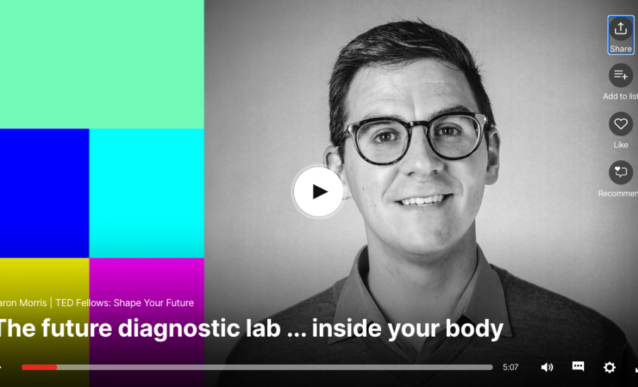Incoming BME Assistant Professor Aaron Morris’s TED Talk released

This article first appeared on the Biomedical Engineering website.
Aaron Morris, PhD, an incoming BME assistant professor, 2018 Precision Health Scholars Award recipient, and current research fellow in the Shea Lab, was selected as a 2020 TED fellow and will participate in a first-ever fellows takeover of TED.com starting on Monday, May 24, 2021. Morris’s talk, titled “The future diagnostic lab inside your body,” is published on TED.com and freely available for viewing.
The talk is a forward-looking view of research conducted by Morris as a postdoc in the U-M BME lab of Dr. Lonnie Shea, PhD, William and Valerie Hall Chair and Steven A. Goldstein Professor of Biomedical Engineering. The lab also collaborated with Dr. David Irani at Michigan Medicine and Dr. Stephen D. Miller at Northwestern University on this project.
The device is a small biocompatible scaffold designed to create a place in the body where specific and identifiable immune cells will gather when diseases such as multiple sclerosis are present. Because the device is right under the skin, biopsies that offer a wealth of information about what’s going on within the body can be performed much more frequently and less invasively than traditional diagnostics.
The concept comes from previous work performed in the Shea Lab, which used a 3D scaffold to attract and catch cancer cells as they attempted to populate attractive sites in the body. The research was then adapted to monitor immune cells that change and congregate at sites, making them ready for tumor cells to attach and multiply. “We looked at that and thought, well ok, if we can use these implants to measure changes in the immune system that happen in cancer, why couldn’t we measure the immune changes that happen in other diseases,” says Morris.
MONITORING RELAPSE
The ability to diagnose a relapse of MS could be life changing for patients managing the disease. The neurological damage done by MS is progressive, getting worse over time. By the time symptoms develop, irreparable damage has already been done. According to Morris, “Fifteen years after diagnosis, about 60% of relapsing or remitting MS patients can’t walk without assistance.” Any improvement in monitoring the relapse of MS could allow doctors to apply treatments before nerve damage can occur.
DIAGNOSE EARLIER
Multiple Sclerosis is difficult to diagnose in the first place. It usually takes some sort of demyelinating event that prompts a patient to go to the doctor. Even then, it’s not always apparent that MS is the underlying cause of a condition. All of this difficulty in diagnosis can lead to delays in treatment and progression of the disease. “It’s a pretty terrible disease, but there’s an opportunity there to diagnose the disease much earlier,” says Morris.
PREDICT EFFICACY
There are many ways to treat MS that work differently for different patients. A final advantage of an easy-to-monitor, quantifiable diagnostic device is that it can be used to predict the effectiveness of various treatments. Having a way to monitor treatments can tell doctors what strategies are effective, without having to monitor symptoms that could be damaging a patient’s nerves. This could also make the process of developing new treatments easier.
Morris’s scientific findings are available in the Nature Communications paper “Engineered immunological niches to monitor disease activity and treatment efficacy in relapsing multiple sclerosis.”
The TED talk featuring Dr. Aaron Morris can be found on the TED website.


